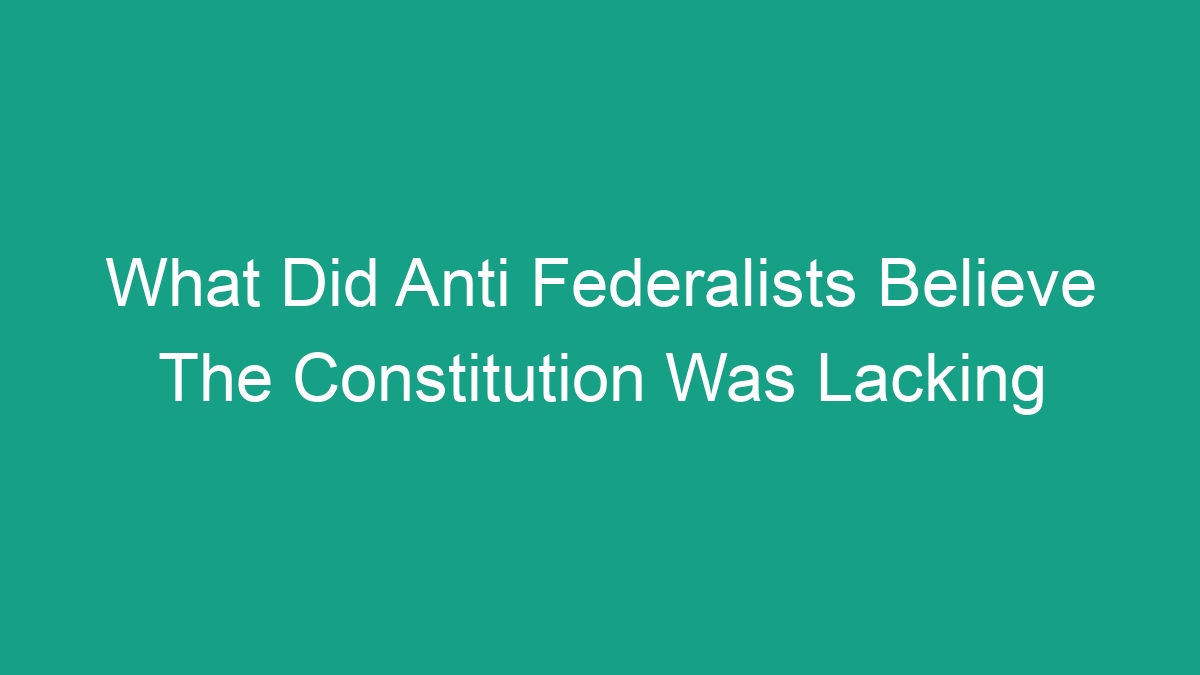
Introduction
When the United States Constitution was being drafted and debated in the late 18th century, there were two main political factions with differing views on the proposed constitution: the Federalists and the Anti-Federalists. While the Federalists supported the ratification of the Constitution, the Anti-Federalists had concerns about the document and argued for a more limited and decentralized government. In this article, we will explore the key beliefs of the Anti-Federalists and what they believed the Constitution was lacking.
Background
The Anti-Federalists were a diverse group of individuals who opposed the ratification of the Constitution in its proposed form. They included prominent figures such as Patrick Henry, George Mason, and Samuel Adams, as well as many ordinary citizens who were concerned about the potential implications of a strong central government. The Anti-Federalists believed that the Constitution as it was written would create a government that was too powerful and could potentially infringe upon the rights of the states and the people.
Concerns about the Lack of a Bill of Rights
One of the primary concerns of the Anti-Federalists was the absence of a Bill of Rights in the original Constitution. They believed that without a Bill of Rights, the individual liberties of citizens would not be adequately protected. The Anti-Federalists argued that a strong central government could abuse its power and infringe upon the freedoms of citizens, and that a Bill of Rights was necessary to ensure that the government could not violate basic rights such as freedom of speech, press, religion, and the right to bear arms.
The absence of a Bill of Rights was a major point of contention during the ratification debates, and the Anti-Federalists pushed for the inclusion of specific protections for individual rights in the Constitution. Ultimately, the Bill of Rights was added to the Constitution in the form of the first ten amendments, addressing many of the concerns raised by the Anti-Federalists.
Fear of a Strong Central Government
Another key belief of the Anti-Federalists was their fear of a strong central government that could potentially encroach upon the powers of the states. They were concerned that the Constitution did not provide adequate checks and balances to limit the authority of the federal government. The Anti-Federalists believed that a centralized government would be more prone to tyranny and abuse of power, and they argued for a more decentralized system in which the states retained significant authority.
The Anti-Federalists were advocates for a system of government in which power was distributed among multiple levels of government, with the states playing a more significant role in policymaking and governance. They feared that a strong central government would undermine the sovereignty of the states and lead to a loss of individual liberty.
Representation and Democracy
The Anti-Federalists also had concerns about the representation of the people in the proposed federal government. They argued that the Constitution did not adequately protect the interests of ordinary citizens and that the makeup of the government would favor the elite and the wealthy. They believed that the absence of direct representation for the people in the federal government would lead to a disconnect between the rulers and the ruled, and that this would ultimately erode the democratic principles upon which the nation was founded.
The Anti-Federalists advocated for a more direct and participatory form of democracy, in which the people would have a greater say in the decision-making process. They argued that the Constitution lacked mechanisms for ensuring that the government was truly accountable to the people, and that this would lead to an erosion of democratic values and principles.
Economic Concerns
In addition to their political and governmental concerns, the Anti-Federalists also had economic objections to the proposed Constitution. They believed that the Constitution favored the wealthy and the business interests at the expense of the common people. The Anti-Federalists were concerned that the federal government would enact policies that would benefit the wealthy few at the expense of the broader population, and that this would exacerbate inequality and economic hardship for many Americans.
The Anti-Federalists argued for a more equitable economic system that would prioritize the needs of the working class and ensure that the government worked in the interest of all citizens, rather than a select few. They believed that the Constitution as it was drafted did not adequately address the economic concerns of the common people and that it would lead to a perpetuation of economic injustice.
Conclusion
In conclusion, the Anti-Federalists had several fundamental concerns about the Constitution and what they perceived as its shortcomings. They believed that the document did not adequately protect individual liberties, provide sufficient checks and balances to limit the power of the federal government, ensure democratic representation, or address economic inequality. Their advocacy for a more decentralized, participatory, and equitable system of government ultimately led to the inclusion of the Bill of Rights and the shaping of the nation’s political and governmental framework.
While the Anti-Federalists were unsuccessful in preventing the ratification of the Constitution, their concerns and beliefs played a significant role in shaping the early political debates of the United States and continue to influence discussions about the nature of government and democracy. Despite their opposition to the Constitution, the Anti-Federalists’ contributions sparked important discussions that ultimately led to the adoption of key amendments and the development of American governmental principles.



